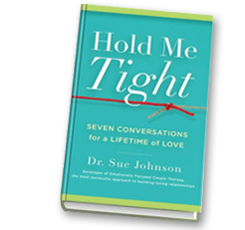
Relationship Counseling
Relationship Counseling at Sentio Counseling Center
It's not unusual for couples, families, and individuals to come to therapy with problems that seem too big to solve. We question our relationships or worry that what we once had is gone forever. We want things to change but aren't sure how to change them. We wonder if we can ever get past hurt feelings and painful events.
Emotionally-Focused Couples Therapy
Emotionally Focused Couples Therapy is an affirming, caring, supportive way to get out of the "stuck places" we all get into. EFCT helps couples and families move beyond fighting and withdrawing into closeness and security. EFCT works to restore the bonds we have formed and secure the connection we desire. An EFCT therapist does more than give you superficial answers to big problems. One of the strengths of EFCT is its map of how couples change — therapists learn how to guide couples on their journey.
EFCT has a substantial research base to support its effectiveness. Studies have found that 70% to 75% of couples move from distress to recovery, and approximately 90% show significant improvements. Those results surprised researchers and therapists because most couples therapies have about a 35% success rate. EFCT continues to be researched and developed to bring couples more satisfying relationships.
Seeking out therapy is big step for may of us. An EFCT therapist will collaborate and consult with you on how to get unstuck and create change that lasts.
How EFCT Works for Couples
What is an EFCT therapy session like?
We collaborate and consult with you to uncover patterns that lead to fighting and defensiveness, while developing new ways of relating and communicating. We work with both partners to build a supportive relationship by fostering the underlying feelings that first brought you into the relationship. Therapy sessions will provide a safe, responsive place to discuss issues including sexuality and infidelity. Our goal is to create a safe supportive bond between partners.
How is EFCT different from other couples therapies?
EFCT has extensive research that supports its effectiveness. Scientific research studies show that over 70 percent of couples in EFCT went from distressed to happy, and 90 percent significantly improved, in 15 to 20 sessions. Perhaps more important, the results were stable two years later. Many other couples therapies provide improvement in about 35 percent of couples by the end of treatment; of those, between 30 and 50 percent relapse within two years.
How long will it take?
The length of your therapy will depend on how deep your conflicts are and how receptive both of you are to therapy. You may need fewer sessions to get back on track, or you may invest in more sessions to get to deeper problems that keep affecting your relationship. Couples therapy generally takes more then ten sessions and fewer then twenty. However, your assessment and treatment plan will be unique to you as a couple, and we will collaborate with you on how much time is appropriate for you.
What if it's too late?
It's hard after you've invested yourself in a relationship and get to this point. Even if you are ending your relationship, therapy can give you a healthier, less destructive way to close it. And therapy may help you find new solutions to the problems that made the relationship become so troubled.
What if one partner won't come in?
Sometimes it's less difficult to agree to just four or five sessions. Then if therapy is helpful you can continue.
Can EFCT help if there was an affair?
We know it takes time to recover from affairs. No one is pressured to forgive their partner if they're not ready. But it is possible for many couples to heal what's happened.
Will you tell us whose fault it is?
Our role is not to be referees. Instead we work to find both partners' part in the "dance" of your relationship, so you can discover together where you may want to change.
Is EFCT appropriate for all kinds of couples?
Yes, all types of couples, with all types of cultural backgrounds, can benefit from EFCT. EFCT is used all over the globe with clients of different ethnicities and religions, and with gay and lesbian couples.
SCC counselors are trained to provide support for many relationship concerns, including the following:
Attachment Difficulties
Codependency
Commitment Issues
Communication Problems
Coparenting
Divorce
Marriage Counseling
Navigating Identity in Relationships
Infertility
Infidelity
Polyamorous and Open Relationships
Premarital Counseling
Sexual Issues

